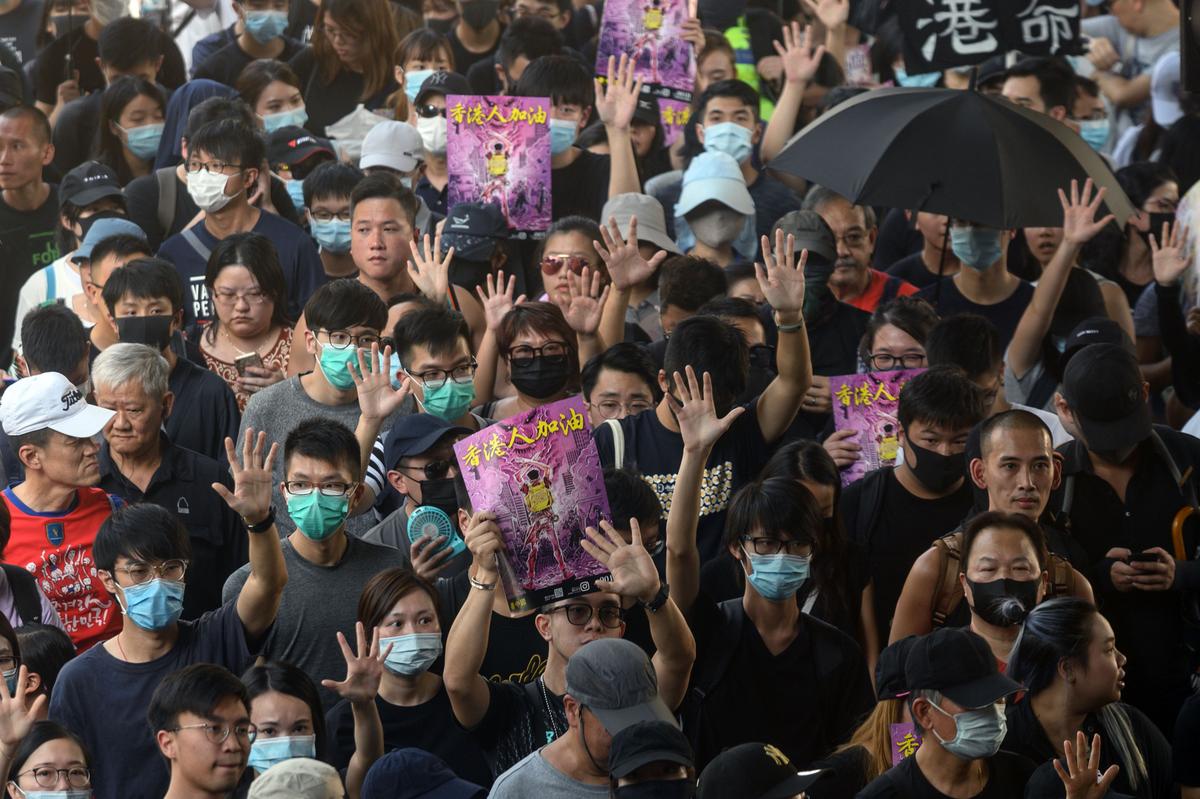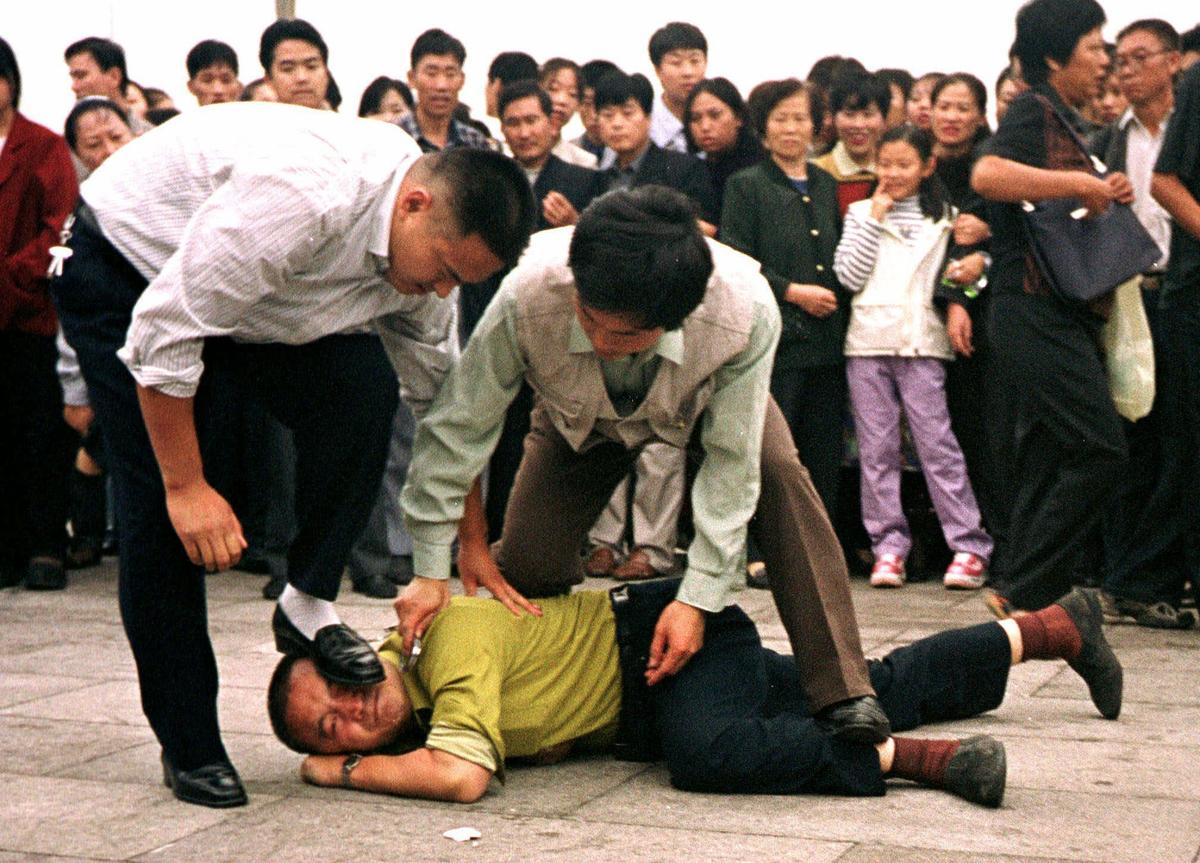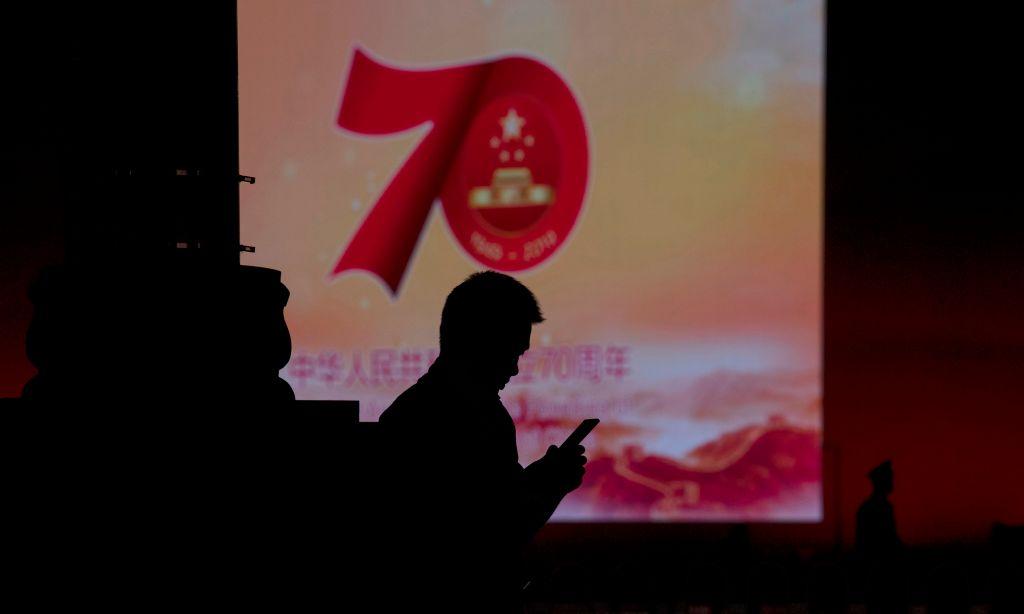The future of the Chinese people, and all humanity, lies in resisting and disintegrating the specter of communism.
Seventy years ago, the Chinese Communist Party (CCP) seized power in mainland China, bringing hundreds of millions of people under its control. On Oct. 1, 1949, it declared the establishment of a “People’s Republic,” beginning a period of brutal tyranny for the world’s most populous country, and a calamity of unprecedented scale for its 5,000-year civilization.
Today, China finds itself caught between two extremes. One is in Beijing, where the CCP dictatorship has put on an immense military parade to brandish its power and dominance. This vacuous show of force belies a desperate sense of insecurity: Strict security measures have been imposed across the city and beyond in the form of a “wartime” lockdown radiating from the capital out to the surrounding provinces.
The other is in Hong Kong, the financial hub that has seen the steady erosion of its autonomy and unique freedoms in the 22 years since it was turned over to the Chinese regime. However, standing up to this encroachment are millions of ordinary Hongkongers who value their liberty and way of life.
After months of protests that began with demonstrations against an extradition bill that would allow the Chinese regime to transfer individuals from Hong Kong to stand trial in Communist Party-controlled courts, the message from the people of Hong Kong is clear: resist authoritarianism and reject the CCP.
The Hongkongers’ actions don’t only represent themselves. Their courage and solidarity has become a voice for all Chinese suffering under the Communist Party’s misrule. On “National Day,” or literally the “day of national celebration,” they embody the truth that this day is no time for rejoicing, but rather a reminder of a 70-year-long national tragedy.

Communism Is the Enemy of China and the World
On Oct. 1, it’s a ritual for the CCP to celebrate the day that, in 1949, it rose to power and imposed its dictatorship over mainland China. For the Chinese people, the last seven decades have been a nightmare of stolen freedoms, trampled dignity, and continuous brutalization of the human spirit.Since usurping power in China, the CCP has opposed not only the Chinese people, but the shared values of the entire human race.
A few days ago, U.S. President Donald Trump, addressing the U.N. General Assembly, warned of the “specter of socialism”:
“Socialism and communism are not about justice. They are not about equality, they are not about lifting up the poor, and they are certainly not about the good of the nations. Socialism and communism are about one thing only: power for the ruling class.”
Trump’s words are a stern reminder to anyone who harbors romantic notions about the socialist movement. The CCP sees socialism as but the primary stage of communism and seeks nothing less than world domination under its banner.
To see these plans in action, one need look no further than the vast sums that the Chinese regime spends on global influence operations: from the Confucius Institutes that spread communist propaganda, to the “Thousand Talents Plan” that takes aim at the intellectual property of the free world; from the predatory infrastructure investments of the “One Belt, One Road” initiative, to the vision of a “shared future for mankind” dominated by the CCP.
At the heart of the trade war between the United States and China is neither a conflict between nations nor a clash of civilizations. The dispute is not a matter of disagreement between East and West, but a question of liberty versus tyranny, good versus evil.
The fight against communism is humanity’s collective struggle with the devil, and surpasses the boundaries of ethnicity and race. Ever since the specter of communism manifested in Europe two centuries ago, the struggle has been waged across all fields, from politics to economy to culture.
Starting with the United States, the governments of the free world have begun to reexamine their post-Cold War policies of appeasement toward the CCP. Tempted by economic gain, proponents of these policies sacrificed the national interests of democratic states to feed the expanding might of the communist superpower.
For the Whole World, Hope Lies in Rejecting the CCP
According to traditional Chinese cosmology, the number nine is associated with calamity and upheaval. This wisdom has held especially true in the course of the CCP’s 70 years of rule.The year 1949 brought the CCP to power, subjecting the Chinese people to multiple waves of brutal political campaigns. In the countryside, the CCP dispatched its cadres to slaughter landlords and those deemed to be rich peasants. In the cities, those who ran businesses or had a Western liberal education were targeted. The torture and execution of millions represented not just the liquidation of an economic class, but also the destruction of China’s cultural elites.
In 1959, the CCP’s collectivization policies culminated in China’s Great Famine. Tens of millions starved to death in agony, while the CCP continued to report bumper harvests and export grains to its allies.
In 1969, at the height of the Cultural Revolution, relations between the CCP and the Soviet Union dropped to the point that military skirmishes were being fought across the Heilongjiang River. These incidents nearly sparked a third world war.
In 1979, the Chinese regime invaded its fellow communist country Vietnam in retaliation for the latter’s toppling of the genocidal Khmer Rouge regime in Cambodia, which was in the CCP’s camp. The war ended in disgrace for the Chinese People’s Liberation Army (PLA).
In 1989, CCP hardliners ousted then-general secretary Zhao Ziyang and ordered the PLA to fire on pro-democracy demonstrators in Tiananmen Square, murdering thousands of patriotic Chinese youth in the center of Beijing.
In 1999, then-Party boss Jiang Zemin, himself an opportunist who came to power in the wake of the Tiananmen Square Massacre, launched the persecution of Falun Gong, a peaceful spiritual discipline with tens of millions of adherents in China. The persecution continues today.
In 2009, following years of repressive policies by the CCP, violent riots erupted in northwestern region of Xinjiang, where many Uyghur Muslim minorities reside. According to eyewitnesses, thousands of people may have died in subsequent massacres by the CCP authorities.
The ongoing events in Hong Kong show that 2019 is no exception to this cosmic principle. Yet, instead of following the mandate of heaven and ruling the people with virtue, the atheist CCP defies nature and conceals its misdeeds, piling tragedy upon tragedy.
At no time has the fundamental conflict between the CCP and humanity’s universal moral principles been clearer than in the last 20 years, following the persecution of Falun Gong ordered by Jiang and his political faction.
The Jiang faction declared the estimated 70 million to 100 million Falun Gong practitioners—whose guiding principles are truthfulness, compassion, and tolerance—to be enemies of the CCP and its atheist Marxism. As the CCP mobilized all state resources for its campaign of terror against Falun Gong, the Jiang faction solidified its control over the Party and state by rewarding and promoting officials who participated in the persecution.

Abandoning all ethical restraints, China has become a country in moral freefall. Officials and ordinary citizens alike have been driven to worship nothing but profit and status. Having been steeped in the culture of the CCP for generations, many Chinese have sold their conscience to participate in its evil policies.
In the persecution of Falun Gong, police officers and judges have ignored the law to arrest and sentence people solely for their faith in truthfulness, compassion, and tolerance. Possessed by money-worship, doctors have betrayed their professional oaths, murdering Falun Gong practitioners on the operating table for their organs.
For decades, the CCP has been able to hide its atrocities from the world, enticing foreign governments and companies with economic benefits and diplomatic overtures.
But the world is waking up to the CCP’s true nature. In the unique setting of Hong Kong, where freedom and rule of law have come to blows with the mainland Chinese dictatorship, millions of Hongkongers have made their choice: to stand on the side of freedom and resist the CCP’s terror tactics.
And in mainland China, many millions more have already taken the first steps toward abandoning the CCP and choosing the future.
Since 2004, more than 340 million people in China and the overseas Chinese diaspora have registered their names with the Tuidang (Quit the Party) movement, renouncing the oaths they made to sacrifice their lives for the CCP and its two youth organizations, the Young Pioneers and the Communist Youth League.
Thirty years after the protests that swept East Germany at the end of the Cold War and brought down the Berlin Wall, this year’s protest movement in Hong Kong has become the spark to light the fires of resistance against the CCP’s brutal tyranny.
Oct. 1, the day marking 70 years of China’s national tragedy, should serve as a call for the Chinese people—and the whole world—to remember their conscience, follow the universal moral principles taught since ancient times, and find hope for the future.





